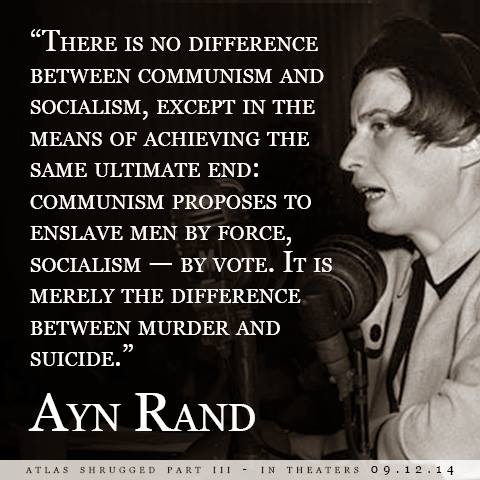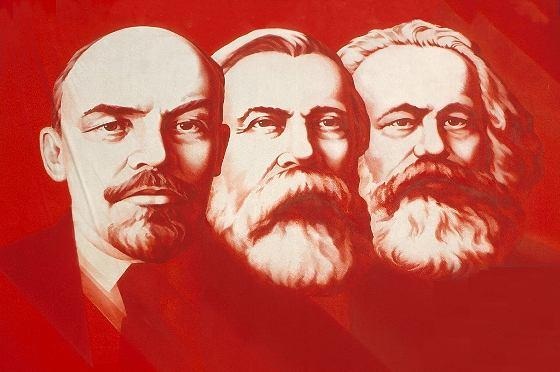First, what is Communism?
Source: http://www.livescience.com/42980-what-is-communism.html
What Is Commuinism?
By Michael Dhar, Live Science Contributor | January 30, 2014 12:39pm ET
Though the term "communism" can refer to specific political parties, at its core, communism is an ideology of economic equality through the elimination of private property.
The beliefs of communism, most famously expressed by Karl Marx, center on the idea that inequality and suffering result from capitalism. Under capitalism, private business people and corporations own all the factories, equipment and other resources called "the means of production." These owners, according to communist doctrine, can then exploit workers, who are forced sell their labor for wages.
The working class — or "proletariat" — must rise up against the capitalist owners, or "bourgeoisie," according to the ideals of communism, and institute a new society with no private property, no economic classes and no profits.
Communism differs from socialism, though the two have similarities. Both philosophies advocate economic equality and state ownership of various goods and services. However, socialism usually works through the existing democratic structures of capitalist countries. Almost all capitalist countries, in fact, have some socialist characteristics, like the public schools and Social Security program in the United States.
In contrast, communists state that capitalist economic and political systems must be completely overthrown through revolution.
Historically, such communist revolutions have never yielded their intended utopias of equality. Communist theory predicts that, after the proletariat revolution, special leaders must temporarily take control of the state, leading it toward an eventual "true" communist society. Thus, the governments of the Soviet Union, communist China, Cuba and others were intended to be provisional. In practice, these "temporary" governments have held on to power, often subjecting their citizens to authoritarian control.
Communist ideology also states that these revolutions should spread across the globe, rather than be limited to individual countries. This helps explain the historical antagonism between capitalist and communist nations — particularly the long Cold War between the United States and the Soviet Union.
What Is Commuinism?
By Michael Dhar, Live Science Contributor | January 30, 2014 12:39pm ET
Though the term "communism" can refer to specific political parties, at its core, communism is an ideology of economic equality through the elimination of private property.
The beliefs of communism, most famously expressed by Karl Marx, center on the idea that inequality and suffering result from capitalism. Under capitalism, private business people and corporations own all the factories, equipment and other resources called "the means of production." These owners, according to communist doctrine, can then exploit workers, who are forced sell their labor for wages.
The working class — or "proletariat" — must rise up against the capitalist owners, or "bourgeoisie," according to the ideals of communism, and institute a new society with no private property, no economic classes and no profits.
Communism differs from socialism, though the two have similarities. Both philosophies advocate economic equality and state ownership of various goods and services. However, socialism usually works through the existing democratic structures of capitalist countries. Almost all capitalist countries, in fact, have some socialist characteristics, like the public schools and Social Security program in the United States.
In contrast, communists state that capitalist economic and political systems must be completely overthrown through revolution.
Historically, such communist revolutions have never yielded their intended utopias of equality. Communist theory predicts that, after the proletariat revolution, special leaders must temporarily take control of the state, leading it toward an eventual "true" communist society. Thus, the governments of the Soviet Union, communist China, Cuba and others were intended to be provisional. In practice, these "temporary" governments have held on to power, often subjecting their citizens to authoritarian control.
Communist ideology also states that these revolutions should spread across the globe, rather than be limited to individual countries. This helps explain the historical antagonism between capitalist and communist nations — particularly the long Cold War between the United States and the Soviet Union.
My Turn...
Communism is a failure in every way, everywhere it has ever been tried. Our Founding Fathers knew this when they created our unique Republic. Yet Communism persists like a boil on the butt of humanity. ~ Rodney Spooner
Communism is a failure in every way, everywhere it has ever been tried. Our Founding Fathers knew this when they created our unique Republic. Yet Communism persists like a boil on the butt of humanity. ~ Rodney Spooner
Source: http://news.yahoo.com/headed-toward-constitution-communist-manifesto-breakdown-tells-191019892.html
Are We Headed Toward the Constitution or the Communist Manifesto? This Breakdown Tells You
By Tiffany Gabbay April 22, 2012 3:10 PM
During his Thursday morning radio broadcast, Glenn Beck asked if America, on its current trajectory, is headed toward the values and principles of the Constitution, or rather, those of the Communist Manifesto.
To glean greater insight, The Blaze expanded on each of the Manifesto’s 10 planks and juxtaposed them with modern day American society. The picture revealed, while perhaps not shocking, is unsettling to say the least.
The Communist Manifesto
To glean greater insight, The Blaze expanded on each of the Manifesto’s 10 planks and juxtaposed them with modern day American society. The picture revealed, while perhaps not shocking, is unsettling to say the least.
The Communist Manifesto
Considered the playbook, the framework, the founding document of Communism, it is argued that no other political volume has altered the course of history more than Karl Marx and Friedrich Engel’s tiny yet effective blueprint for the proletariat. Commissioned by the Communist League, Marx and Engels laid out their analysis of capitalism and class struggle while supposedly offering economic and socio-political “solutions” rooted in what they called science. While every instance of Communism attempted around the globe has since failed abysmally and without exception, proponents still cry that Marx’s inviolable political and economic theories were simply “improperly executed” and thus, if true to the Manifesto, Marxism is, in itself, “perfect.” A little known fact, however, is that these champions’ premise is based on a flawed narrative, as Karl Marx in fact falsified much of the data he used to support his untenable political and economic system. Of Marx’s flagrant disregard for the facts, British philosopher Anthony Flew wrote:
…the first and only volume of Das Kapital to be published in the lifetime of Marx was, in his own words, to demonstrate that “In proportion as capital accumulates, the lot of the labourer must grow worse. Accumulation of wealth at one pole is at the same time accumulation of misery, agony of toil, slavery, ignorance, brutality, mental degradation at the opposite pole.” But by 1867, when that volume was first published, Marx had known for 15 or more years that this thesis was false.
Flew continued that Marx’s response was “merely to suppress the falsifying data.” This was manifested in the first edition of Das Kapital where “various available British statistics—about the reliability of which there was no question—were given up to 1865 or 1866, whereas those for the movement of wages stop at 1850.” In Kapital’s second edition, however, according to Flew, all subsequent runs were “brought up to date, while that of wage movements still stops at 1850.”
While clearly not a “man of science,” nor one who held facts in high regard, generations of leftists take the words of Karl Marx as absolute truth, and indeed, the gospel. Below are the tenets they seek to live by, as mapped out in his “magnum opus.”
1. Abolition of private property
The first plank of Communism is the abolishment of private property. America is certainly here in terms of eminent domain, where the state has the ability to expropriate private property “for the public good.” Per the Fifth Amendment, the government must fairly compensate a citizen in return, but lines tend to blur when the government is given the authority to assess what is “fair and just” in the first place. Regardless of whether the final sum is one agreeable to the private citizen, the property will still be confiscated with or without the owner’s consent.
While clearly not a “man of science,” nor one who held facts in high regard, generations of leftists take the words of Karl Marx as absolute truth, and indeed, the gospel. Below are the tenets they seek to live by, as mapped out in his “magnum opus.”
1. Abolition of private property
The first plank of Communism is the abolishment of private property. America is certainly here in terms of eminent domain, where the state has the ability to expropriate private property “for the public good.” Per the Fifth Amendment, the government must fairly compensate a citizen in return, but lines tend to blur when the government is given the authority to assess what is “fair and just” in the first place. Regardless of whether the final sum is one agreeable to the private citizen, the property will still be confiscated with or without the owner’s consent.
Typically, land or property acquired through eminent domain is used to house public works that are intended to benefit the community such as public utilities, freeways, libraries and schools. It is a slippery slope, however. After the Supreme Court’s ruling in Kelo v. City of New London, the scope of eminent domain was expanded outside its traditional boundaries to include revitalizing “depressed areas.” In other words, in the spirit of gentrification or regeneration, a citizen’s private property can be seized by the government to build a sports complex, or even a shopping mall if the state deems it a public good. Another example of government encroachment on citizens’ private property is evident in the far-reach of Fannie Mae and Freddie Mac, the two Government Sponsored Enterprises (GSE) that buy mortgages on the secondary market. If a citizen’s mortgage is held by one of these government-backed giants, Uncle Sam is entirely “too close to home.”
Interconnected is property tax. Simply, if one is subject to property tax, then the land or property being taxed doesn’t actually belong to the “owner.” Fall behind on these payments and the government will seize a citizen’s home, business or land, regardless of whether his or her mortgage is paid in full.
Interconnected is property tax. Simply, if one is subject to property tax, then the land or property being taxed doesn’t actually belong to the “owner.” Fall behind on these payments and the government will seize a citizen’s home, business or land, regardless of whether his or her mortgage is paid in full.
Homes are not the only area subject to government encroachment, however. In fact, Uncle Sam owns roughly 650 million acres of land across the 50 states — with its highest ownership stake (85%) in Nevada. The Federal Emergency Management Agency (FEMA) also has the authority to seize private property during “emergency” situations. 2. Heavy progressive income tax
This particular tenet needs no introduction, nor example. America now holds the world record for highest corporate tax rate, surpassing even Japan. This is a crucial plank of the Manifesto, as it ensures that nary a high income earner will remain standing and everyone may subsist in equal mediocrity or (worse).
Ironically, Communists bang on incessantly about “equality” when in fact a flat-tax is arguably the fairest system of all and one that would, by design, ensure “from each according to his abilities, to each according to his needs.” If a 10% flat tax were implemented, then 10% of a $5,000 income would amount to far less than 10% of a $500,000 income. Thus, those who make more money, still pay more. Alas, that is certainly not the way Marx would have portrayed it. Nor is it the way the current administration seems to see it given the president’s renewed push to instate ”The Buffett Rule,” which seeks to raise the income tax rate on high income earners — including small business owners — even higher than it is now.
Regardless, whether one is subject to a flat or a progressive tax system, a foreboding and omnipotent force looms dangerously over the American ether: The IRS. Fail to pay your “fair share,” and you will soon learn of the government’s ultimate power — to freeze your bank accounts, seize your property, penalize and, in some instances even imprison you. There is perhaps no greater example of a Marxist economic policy in action than this.
3. Abolition to all rights of inheritance
One of the many stark contradictions found in the Manifesto is outlined in this particular pillar. What was most ironic about Marx’s desire to abolish inheritance was that, if he had his way, citizens would not own anything of value to bequeath upon death in the first place. Nonetheless, his odd and arguably redundant tenet has worked its way into the American landscape via the estate tax — and its very alias, the “death tax.” This alone should raise eyebrows, if not outright suspicion of government’s dubious motives.
First, many argue the estate tax is unconstitutional because it creates a direct tax that is not disbursed to the states for collection. But the more obvious discrepancy is that it allows the government to tax individuals twice, as the items that find their way into one’s estate — be they a car, house, land, jewelry or other valuable possessions — have already been subject to either sales or property tax once before. The Federal government’s carte blanche to double-dip is spurred further by Democrats’ renewed push to resurrect and expand what the Wall Street Journal dubs President Obama’s “night of living death tax.”
With the staggering rate applied to estates worth over $5 million, citizens may soon wonder why it is worth the bother to spend a lifetime building a personal or business empire to pass down to their children and grandchildren at all. By the second generation, there would be nothing left.
4. Confiscation of property of all emigrants & rebels
This Manifesto pillar is perhaps best laid out in the recent string of government crackdowns on “homegrown militias.” Those who have paid careful attention to Janet Napolitano know that one of Homeland Security’s preoccupations of late has been the “rise” of “homegrown militias.” With this in mind, the department is likely honing in on anyone considered an “opposition group,” be they merely survivalists or those with a more militant bent.
Some may recall the Michigan militia, or ”Hutaree,” as they are known — a group of anti-government “rebels” who were allegedly engaged in preparations for a potential future clash with federal agencies. The defendants were accused of conspiring to overthrow the U.S. government, a planned assassination of a police officer, and an ambush of that officer’s funeral with explosives in order to incite an uprising against the Federal government. While the anticipated attack never actually occurred, this did not stop the Feds, under the blessing of Attorney General Eric Holder, from raiding the Hutaree’s various outposts, confiscating its members’ arms and waging an all-out legal battle against the group.
At the end of March, 2012, presiding U.S. District Judge Victoria Roberts dismissed the most serious of the charges against the Hutaree, leveling a staggering blow to the Fed. She said the members’ hatred of government did not amount to a conspiracy to overthrow it.
It remains unclear whether the Hutaree were indeed poised to be the aggressors of a violent assault or if they were simply anti-big-government, “good ol’ boy“ survivalists preparing to ”defend themselves” against a perceived government threat. But the Federal agencies’ indictment of the group perhaps reveals how government will deal with homegrown “threats” — be they real or perceived — moving forward.
This particular tenet needs no introduction, nor example. America now holds the world record for highest corporate tax rate, surpassing even Japan. This is a crucial plank of the Manifesto, as it ensures that nary a high income earner will remain standing and everyone may subsist in equal mediocrity or (worse).
Ironically, Communists bang on incessantly about “equality” when in fact a flat-tax is arguably the fairest system of all and one that would, by design, ensure “from each according to his abilities, to each according to his needs.” If a 10% flat tax were implemented, then 10% of a $5,000 income would amount to far less than 10% of a $500,000 income. Thus, those who make more money, still pay more. Alas, that is certainly not the way Marx would have portrayed it. Nor is it the way the current administration seems to see it given the president’s renewed push to instate ”The Buffett Rule,” which seeks to raise the income tax rate on high income earners — including small business owners — even higher than it is now.
Regardless, whether one is subject to a flat or a progressive tax system, a foreboding and omnipotent force looms dangerously over the American ether: The IRS. Fail to pay your “fair share,” and you will soon learn of the government’s ultimate power — to freeze your bank accounts, seize your property, penalize and, in some instances even imprison you. There is perhaps no greater example of a Marxist economic policy in action than this.
3. Abolition to all rights of inheritance
One of the many stark contradictions found in the Manifesto is outlined in this particular pillar. What was most ironic about Marx’s desire to abolish inheritance was that, if he had his way, citizens would not own anything of value to bequeath upon death in the first place. Nonetheless, his odd and arguably redundant tenet has worked its way into the American landscape via the estate tax — and its very alias, the “death tax.” This alone should raise eyebrows, if not outright suspicion of government’s dubious motives.
First, many argue the estate tax is unconstitutional because it creates a direct tax that is not disbursed to the states for collection. But the more obvious discrepancy is that it allows the government to tax individuals twice, as the items that find their way into one’s estate — be they a car, house, land, jewelry or other valuable possessions — have already been subject to either sales or property tax once before. The Federal government’s carte blanche to double-dip is spurred further by Democrats’ renewed push to resurrect and expand what the Wall Street Journal dubs President Obama’s “night of living death tax.”
With the staggering rate applied to estates worth over $5 million, citizens may soon wonder why it is worth the bother to spend a lifetime building a personal or business empire to pass down to their children and grandchildren at all. By the second generation, there would be nothing left.
4. Confiscation of property of all emigrants & rebels
This Manifesto pillar is perhaps best laid out in the recent string of government crackdowns on “homegrown militias.” Those who have paid careful attention to Janet Napolitano know that one of Homeland Security’s preoccupations of late has been the “rise” of “homegrown militias.” With this in mind, the department is likely honing in on anyone considered an “opposition group,” be they merely survivalists or those with a more militant bent.
Some may recall the Michigan militia, or ”Hutaree,” as they are known — a group of anti-government “rebels” who were allegedly engaged in preparations for a potential future clash with federal agencies. The defendants were accused of conspiring to overthrow the U.S. government, a planned assassination of a police officer, and an ambush of that officer’s funeral with explosives in order to incite an uprising against the Federal government. While the anticipated attack never actually occurred, this did not stop the Feds, under the blessing of Attorney General Eric Holder, from raiding the Hutaree’s various outposts, confiscating its members’ arms and waging an all-out legal battle against the group.
At the end of March, 2012, presiding U.S. District Judge Victoria Roberts dismissed the most serious of the charges against the Hutaree, leveling a staggering blow to the Fed. She said the members’ hatred of government did not amount to a conspiracy to overthrow it.
It remains unclear whether the Hutaree were indeed poised to be the aggressors of a violent assault or if they were simply anti-big-government, “good ol’ boy“ survivalists preparing to ”defend themselves” against a perceived government threat. But the Federal agencies’ indictment of the group perhaps reveals how government will deal with homegrown “threats” — be they real or perceived — moving forward.
Another key element, and one that warrants mention due to its relevance in modern day America, is the confiscation of citizens’ weapons. Those who have felt their Second Amendment rights slowly whittle away understand that disarming the public is a crucial step vital to ensuring the state’s grip over its citizenry. In fact, one of the first tasks performed by the then-fledgling Soviet state was the confiscation of citizens’ private arms — even hunting rifles. By stripping people of the ability to defend themselves, the authoritarian state could reign over the vulnerable Russian populace. Many Americans consider this a highly plausible reality given increasingly stringent gun laws and regulations spread across all 50-states. It should also be noted that IRS liens, levies and seizures are all means by which the Federal government can confiscate a “rebel” entity’s assets — one instance being the recent IRS “shakedown” of Tea Party members. And, in terms of “emigrants,” taxing the off-shore income and assets of American citizens, or causing Americans to give up their U.S. citizenship and flee to foreign lands to avoid abusive U.S. taxes, is yet another means by which the Fed’s confiscatory, overreaching tentacles are changing the American landscape. Statistics point out a rising trend…
5. Centralization and monopolization of credit by means of a national bank
5. Centralization and monopolization of credit by means of a national bank
Created by Congress in 1913, the Federal Reserve is, for all intents and purposes, America‘s national bank charged with setting the monetary policy that controls the nation’s economic stability. The Federal Reserve holds the power to guide interest rates, thus controlling inflation. The effects of this agency’s actions are felt in measurable ways by everyday Americans, every day. From the interest rate accrued to mortgages and other lines of credit to determining the value of one’s home, it is both the seen and unforeseen reach of this institution that sets the tone for Americans’ financial security. On the grander scale, the Federal Reserve has the more sinister power of devaluing U.S. currency, and thus the value of goods, services and property, via “quantitative easing,” or, as it is affectionately dubbed, printing money.
“One of the fundamental problems with the U.S. economy right now is the Federal Reserve thinks the answer to all our economic problems is printing money,” said the Wall Street Journal’s Stephen Moore. “We haven’t created new jobs from all of this printing of money, but what we have produced is inflation in prices.”
6. Centralized control of communication & transportation
a) Transportation
The ways in which the Federal government controls America’s communication and transportation systems are almost too vast to count, but a few shining examples stand out. In terms of transportation, the Interstate Highway System, the Federal Aviation Authority and the Department of Transportation are of course the most obvious government bureaucracies controlling the country’s means of transport. Less-obvious, perhaps, is Amtrak, a government owned corporation and essentially the only passenger rail carrier in the country. Indeed the railroad industry’s metamorphosis from a private enterprise to a nationalized entity perhaps tells the greatest tale of the insidious ways in which the Federal government appropriates what it wants, when it wants.
“One of the fundamental problems with the U.S. economy right now is the Federal Reserve thinks the answer to all our economic problems is printing money,” said the Wall Street Journal’s Stephen Moore. “We haven’t created new jobs from all of this printing of money, but what we have produced is inflation in prices.”
6. Centralized control of communication & transportation
a) Transportation
The ways in which the Federal government controls America’s communication and transportation systems are almost too vast to count, but a few shining examples stand out. In terms of transportation, the Interstate Highway System, the Federal Aviation Authority and the Department of Transportation are of course the most obvious government bureaucracies controlling the country’s means of transport. Less-obvious, perhaps, is Amtrak, a government owned corporation and essentially the only passenger rail carrier in the country. Indeed the railroad industry’s metamorphosis from a private enterprise to a nationalized entity perhaps tells the greatest tale of the insidious ways in which the Federal government appropriates what it wants, when it wants.
The once flourishing U.S. rail industry’s day in the sun was eclipsed when the Fed introduced a “rate-setting” scheme by which rail carriers were forced to adopt. The result was a decrease in profits, decrease in rail system growth, decrease in investments and an increase in labor costs. Not surprisingly, this had the reverse effect than that intended by the Fed when it first set rail carrier rates.. Inevitably, a battered Amtrak gave way to government take-over. The obvious lesson here is that if it can happen to Amtrak there is no reason to think it couldn’t just as easily happen to a commercial air carrier, for example, or any other privately held mode of transportation. As mentioned above, air traffic, ground traffic and maritime traffic via the nation’s port authorities are all overseen and subject to take-over by the government should FEMA deem a state of emergency.
b) Communication
Presently, when it comes to communication, conservatives argue that nothing screams of Marxism louder than the Federal Communications Commission and Obama’s appointment of its “Chief Diversity Officer,” Frank Lloyd.
b) Communication
Presently, when it comes to communication, conservatives argue that nothing screams of Marxism louder than the Federal Communications Commission and Obama’s appointment of its “Chief Diversity Officer,” Frank Lloyd.
One of the administration’s many “czars,” Lloyd was a senior fellow at the progressive think tank, Center for American Progress, where he authored a June 2007 report titled, ”The Structural Imbalance of Political Talk Radio.” The content may point to Lloyd’s intentions when it comes to silencing voices of opposition, and many conservatives believe that Obama’s “Diversity Czar” intends to revive the Fairness Doctrine. For those unfamiliar, the Fairness Doctrine, adopted in 1949, obligated broadcasters to provide opposing points of view on issues of national importance regardless of actual market demand for the content. Media Research Center’s Setton Motley said, if reinstated, caps would be placed on local and national ownership of commercial radio stations; local accountability over licensing would be ensured; and those not in compliance would be subject to paying a fee to support public broadcasting. As it stands, the FCC already levies heavy regulations on broadcasters and monitors all communication aired across radio and television waves.
Looking forward, another impending threat can be found in the current struggle for control over the Internet. Currently, the World Wide Web is controlled by the U.S. government via the Internet Corporation for Assigned Names and Numbers (ICANN) and its subsidiary, the Internet Assigned Numbers Authority (IANA). Both are under the auspices of the U.S. Department of Commerce.
There has been a growing push, however, for America to relinquish its control in the name of a world “without borders,“ or ”one world government.” Countries like China and Russia, in particular, have vied for control, doggedly pursuing the United Nations for assistance in breaking the U.S. stronghold.
If the U.N.’s International Telecommunication Union (ITU), along with its nearly 200 member state allies were to take control of the levers, cyber security and data privacy would be subject to international control.
While even in the land of the free no information received or transmitted over the Internet escapes the prying eyes of Big Brother, it goes without saying America’s First Amendment rights still ensure a far more liberated information superhighway than the one that would exist under the reins of a dubious global body formed by the U.N. and led by China and Russia. Meanwhile, the entire global economy hangs in the balance.
7. Government ownership of factories
In terms of government owned factories, few could ever forget “Government Motors.” After nearly $53 billion in bailout funds over the course of two administrations, the U.S. government now owns a controlling stake in GM, raising the obvious question of how government can fairly regulate its own business. While GM asked the government to intervene, and while Amtrak was instead a victim of a federally-engineered scheme, both are examples of how government assumes control of private enterprise. Typically, it is the American taxpayer who fails to reap the dividends and becomes the victim of these machinations.
8. Equal liability of all to labor
The first thought which springs to mind when reading the Manifesto’s tenet on equal labor is the overriding presence of labor unions within the U.S. workforce. While labor unions in and of themselves are not nationalized organizing bodies, they have enjoyed a long and harmonious relationship with government, particularly through the progressive policies and lawmakers that prop up their various agendas. In fact, there may be no brighter an illustration of socialism manifested than the collective organizing body of America’s labor unions. Although subject to regulation and oversight by the National Labor Relations Board (NLRB), unions still overwhelmingly support Democratic candidates, thus a cycle of quid pro quo is perpetuated.
Another example of government control in the workplace emerges via the Labor Department’s Affirmative Action policies. By mandating that employers meet a staff-quota comprised of women, minorities and people with disabilities, private business is being forced to relinquish its ability to hire on the basis of merit, thus failing to deliver excellence and best practices. While many women, minorities and those with disabilities do indeed possess the skill sets needed to succeed in a specific job, it should, critics argue, be left to private enterprise to determine which candidate is best suited for the task at hand.
9. Combination of agriculture with manufacturing industries
Looking forward, another impending threat can be found in the current struggle for control over the Internet. Currently, the World Wide Web is controlled by the U.S. government via the Internet Corporation for Assigned Names and Numbers (ICANN) and its subsidiary, the Internet Assigned Numbers Authority (IANA). Both are under the auspices of the U.S. Department of Commerce.
There has been a growing push, however, for America to relinquish its control in the name of a world “without borders,“ or ”one world government.” Countries like China and Russia, in particular, have vied for control, doggedly pursuing the United Nations for assistance in breaking the U.S. stronghold.
If the U.N.’s International Telecommunication Union (ITU), along with its nearly 200 member state allies were to take control of the levers, cyber security and data privacy would be subject to international control.
While even in the land of the free no information received or transmitted over the Internet escapes the prying eyes of Big Brother, it goes without saying America’s First Amendment rights still ensure a far more liberated information superhighway than the one that would exist under the reins of a dubious global body formed by the U.N. and led by China and Russia. Meanwhile, the entire global economy hangs in the balance.
7. Government ownership of factories
In terms of government owned factories, few could ever forget “Government Motors.” After nearly $53 billion in bailout funds over the course of two administrations, the U.S. government now owns a controlling stake in GM, raising the obvious question of how government can fairly regulate its own business. While GM asked the government to intervene, and while Amtrak was instead a victim of a federally-engineered scheme, both are examples of how government assumes control of private enterprise. Typically, it is the American taxpayer who fails to reap the dividends and becomes the victim of these machinations.
8. Equal liability of all to labor
The first thought which springs to mind when reading the Manifesto’s tenet on equal labor is the overriding presence of labor unions within the U.S. workforce. While labor unions in and of themselves are not nationalized organizing bodies, they have enjoyed a long and harmonious relationship with government, particularly through the progressive policies and lawmakers that prop up their various agendas. In fact, there may be no brighter an illustration of socialism manifested than the collective organizing body of America’s labor unions. Although subject to regulation and oversight by the National Labor Relations Board (NLRB), unions still overwhelmingly support Democratic candidates, thus a cycle of quid pro quo is perpetuated.
Another example of government control in the workplace emerges via the Labor Department’s Affirmative Action policies. By mandating that employers meet a staff-quota comprised of women, minorities and people with disabilities, private business is being forced to relinquish its ability to hire on the basis of merit, thus failing to deliver excellence and best practices. While many women, minorities and those with disabilities do indeed possess the skill sets needed to succeed in a specific job, it should, critics argue, be left to private enterprise to determine which candidate is best suited for the task at hand.
9. Combination of agriculture with manufacturing industries
The Tennessee Valley Authority (TVA), a government owned corporation, has been hailed a prime example of true socialism in America. It is the country’s largest public power company, with a generating capacity of 31,658 megawatts. Its 17,000 miles of transmission lines deliver power through 158 locally owned distributors to 8.5 million residents of the Tennessee Valley. While even Republicans, for the most part, consider TVA to be a success, its case is considered unique in that the government model has never been able to be successfully duplicated along any other State waterway. Agricultural subsidies are another prime example of this Manifesto plank in motion. An extensive analysis conducted by the CATO Institute determined that, when it comes to corporate welfare no one has reaped a greater windfall, or hurt taxpayers more than the “supermarket to the world,” Archer Daniels. An excerpt from the report reads:
ADM and its chairman Dwayne Andreas have lavishly fertilized both political parties with millions of dollars in handouts and in return have reaped billion-dollar windfalls from taxpayers and consumers. Thanks to federal protection of the domestic sugar industry, ethanol subsidies, subsidized grain exports, and various other programs, ADM has cost the American economy billions of dollars since 1980 and has indirectly cost Americans tens of billions of dollars in higher prices and higher taxes over that same period. At least 43 percent of ADM’s annual profits are from products heavily subsidized or protected by the American government. Moreover, every $1 of profits earned by ADM’s corn sweetener operation costs consumers $10, and every $1 of profits earned by its ethanol operation costs taxpayers $30
Aside from being incongruent with the free market, the nation’s agricultural subsidies cost tax payers tens of billions of dollars each year and typically only benefit larger farming outfits.
On the flip side, the Environmental Protection Agency (EPA) is placing greater and greater restrictions on business in the form of cap and trade and in mandating the purchase of carbon credits.
10. Free education for all children in government controlled schools
What can be said of America’s beleaguered public education system could fill volumes, yet one needn’t look far to pluck one or two prime examples as proof that there are indeed no “free lunches.”
The Blaze recently uncovered a series of reports revealing what happens when a bureaucrat decides that the school district, along with its unionized faculty members, know better about a child’s needs than his or her parents do. Whether the control comes via mandating a child’s school lunch box contents, or altering the Pledge of Allegiance to omit the phrase “one nation under God,” or subjecting students to inadequate instruction from a teacher solely on the basis of that teacher’s tenure – a teacher who cannot be fired or replaced — the public school system is, arguably, setting up generations for failure.
Free medicine…the 11th tenet?
On the flip side, the Environmental Protection Agency (EPA) is placing greater and greater restrictions on business in the form of cap and trade and in mandating the purchase of carbon credits.
10. Free education for all children in government controlled schools
What can be said of America’s beleaguered public education system could fill volumes, yet one needn’t look far to pluck one or two prime examples as proof that there are indeed no “free lunches.”
The Blaze recently uncovered a series of reports revealing what happens when a bureaucrat decides that the school district, along with its unionized faculty members, know better about a child’s needs than his or her parents do. Whether the control comes via mandating a child’s school lunch box contents, or altering the Pledge of Allegiance to omit the phrase “one nation under God,” or subjecting students to inadequate instruction from a teacher solely on the basis of that teacher’s tenure – a teacher who cannot be fired or replaced — the public school system is, arguably, setting up generations for failure.
Free medicine…the 11th tenet?
While not addressed specifically in the 10 tenets of the Communist Manifesto, national health care is perhaps — at least in modern day America — “the key to the empire.” It is why the fate of Obamacare is of utmost importance to the left. If passed, it sets precedent by establishing the “new normal” in government authority over private citizens. Legal experts and pundits alike have consistently argued the unconstitutionality of the health care bill, underscoring its significance as a “gateway” to other forms of government intrusion. The bill’s unconstitutionality is irrelevant to those who, while claiming to champion the founding document, appear to be working to dismantle it.
Some balk at the use of the word “Communism,” dismissing its invocation as hyperbole. Yet when dissecting actual policies, laws, regulations and bureaucratic government approaches which Americans are increasingly subjected to, and weighing them against the 10 progressive “rules to live by,” the facts scream loudly and clearly in the face of those who deny the ever-creeping onset of Socialism. Marx’s Communist “utopia” is only one evolutionary stage away from reality.
Follow Tiffany Gabbay on Twitter
Some balk at the use of the word “Communism,” dismissing its invocation as hyperbole. Yet when dissecting actual policies, laws, regulations and bureaucratic government approaches which Americans are increasingly subjected to, and weighing them against the 10 progressive “rules to live by,” the facts scream loudly and clearly in the face of those who deny the ever-creeping onset of Socialism. Marx’s Communist “utopia” is only one evolutionary stage away from reality.
Follow Tiffany Gabbay on Twitter
The Naked Communist

Source: http://en.wikipedia.org/wiki/The_Naked_Communist
The Naked Communist is a 1958 book by an ex FBI agent, conservative United States author and faith-based political theorist Cleon Skousen.
The author posits and seeks to describe a geopolitical strategy by which the Marxist–Leninist Soviet Union was attempting to overcome and control all the governments of the world that were not members of the Communist bloc. At the time that the book was published, during the Cold War, fear of communism was common among people in non-communist nations.
The list of communist goals contained in the book was read into the Congressional Record by U.S. Congressman Albert S. Herlong, Jr. of Florida, on January 10, 1963.
The Naked Communist is a 1958 book by an ex FBI agent, conservative United States author and faith-based political theorist Cleon Skousen.
The author posits and seeks to describe a geopolitical strategy by which the Marxist–Leninist Soviet Union was attempting to overcome and control all the governments of the world that were not members of the Communist bloc. At the time that the book was published, during the Cold War, fear of communism was common among people in non-communist nations.
The list of communist goals contained in the book was read into the Congressional Record by U.S. Congressman Albert S. Herlong, Jr. of Florida, on January 10, 1963.
Congressional Record--Appendix, pp. A34-A35 January 10, 1963
Current Communist Goals
EXTENSION OF REMARKS OF HON. A. S. HERLONG, JR. OF FLORIDA
IN THE HOUSE OF REPRESENTATIVES
Thursday, January 10, 1963
Mr. HERLONG. Mr. Speaker, Mrs. Patricia Nordman of De Land, Fla., is an ardent and articulate opponent of communism, and until recently published the De Land Courier, which she dedicated to the purpose of alerting the public to the dangers of communism in America.
At Mrs. Nordman's request, I include in the RECORD, under unanimous consent, the following "Current Communist Goals," which she identifies as an excerpt from "The Naked Communist," by Cleon Skousen:
[From "The Naked Communist," by Cleon Skousen]
CURRENT COMMUNIST GOALS
1. U.S. acceptance of coexistence as the only alternative to atomic war.
2. U.S. willingness to capitulate in preference to engaging in atomic war.
3. Develop the illusion that total disarmament [by] the United States would be a demonstration of moral strength.
4. Permit free trade between all nations regardless of Communist affiliation and regardless of whether or not items could be used for war.
5. Extension of long-term loans to Russia and Soviet satellites.
6. Provide American aid to all nations regardless of Communist domination.
7. Grant recognition of Red China. Admission of Red China to the U.N.
8. Set up East and West Germany as separate states in spite of Khrushchev's promise in 1955 to settle the German question by free elections under supervision of the U.N.
9. Prolong the conferences to ban atomic tests because the United States has agreed to suspend tests as long as negotiations are in progress.
10. Allow all Soviet satellites individual representation in the U.N.
11. Promote the U.N. as the only hope for mankind. If its charter is rewritten, demand that it be set up as a one-world government with its own independent armed forces. (Some Communist leaders believe the world can be taken over as easily by the U.N. as by Moscow. Sometimes these two centers compete with each other as they are now doing in the Congo.)
12. Resist any attempt to outlaw the Communist Party.
13. Do away with all loyalty oaths.
14. Continue giving Russia access to the U.S. Patent Office.
15. Capture one or both of the political parties in the United States.
16. Use technical decisions of the courts to weaken basic American institutions by claiming their activities violate civil rights.
17. Get control of the schools. Use them as transmission belts for socialism and current Communist propaganda. Soften the curriculum. Get control of teachers' associations. Put the party line in textbooks.
18. Gain control of all student newspapers.
19. Use student riots to foment public protests against programs or organizations which are under Communist attack.
20. Infiltrate the press. Get control of book-review assignments, editorial writing, policymaking positions.
21. Gain control of key positions in radio, TV, and motion pictures.
22. Continue discrediting American culture by degrading all forms of artistic expression. An American Communist cell was told to "eliminate all good sculpture from parks and buildings, substitute shapeless, awkward and meaningless forms."
23. Control art critics and directors of art museums. "Our plan is to promote ugliness, repulsive, meaningless art."
24. Eliminate all laws governing obscenity by calling them "censorship" and a violation of free speech and free press.
25. Break down cultural standards of morality by promoting pornography and obscenity in books, magazines, motion pictures, radio, and TV.
26. Present homosexuality, degeneracy and promiscuity as "normal, natural, healthy."
27. Infiltrate the churches and replace revealed religion with "social" religion. Discredit the Bible and emphasize the need for intellectual maturity which does not need a "religious crutch."
28. Eliminate prayer or any phase of religious expression in the schools on the ground that it violates the principle of "separation of church and state."
29. Discredit the American Constitution by calling it inadequate, old-fashioned, out of step with modern needs, a hindrance to cooperation between nations on a worldwide basis.
30. Discredit the American Founding Fathers. Present them as selfish aristocrats who had no concern for the "common man."
31. Belittle all forms of American culture and discourage the teaching of American history on the ground that it was only a minor part of the "big picture." Give more emphasis to Russian history since the Communists took over.
32. Support any socialist movement to give centralized control over any part of the culture--education, social agencies, welfare programs, mental health clinics, etc.
33. Eliminate all laws or procedures which interfere with the operation of the Communist apparatus.
34. Eliminate the House Committee on Un-American Activities.
35. Discredit and eventually dismantle the FBI.
36. Infiltrate and gain control of more unions.
37. Infiltrate and gain control of big business.
38. Transfer some of the powers of arrest from the police to social agencies. Treat all behavioral problems as psychiatric disorders which no one but psychiatrists can understand [or treat].
39. Dominate the psychiatric profession and use mental health laws as a means of gaining coercive control over those who oppose Communist goals.
40. Discredit the family as an institution. Encourage promiscuity and easy divorce.
41. Emphasize the need to raise children away from the negative influence of parents. Attribute prejudices, mental blocks and retarding of children to suppressive influence of parents.
42. Create the impression that violence and insurrection are legitimate aspects of the American tradition; that students and special-interest groups should rise up and use ["]united force["] to solve economic, political or social problems.
43. Overthrow all colonial governments before native populations are ready for self-government.
44. Internationalize the Panama Canal.
45. Repeal the Connally reservation so the United States cannot prevent the World Court from seizing jurisdiction [over domestic problems. Give the World Court jurisdiction] over nations and individuals alike.
Current Communist Goals
EXTENSION OF REMARKS OF HON. A. S. HERLONG, JR. OF FLORIDA
IN THE HOUSE OF REPRESENTATIVES
Thursday, January 10, 1963
Mr. HERLONG. Mr. Speaker, Mrs. Patricia Nordman of De Land, Fla., is an ardent and articulate opponent of communism, and until recently published the De Land Courier, which she dedicated to the purpose of alerting the public to the dangers of communism in America.
At Mrs. Nordman's request, I include in the RECORD, under unanimous consent, the following "Current Communist Goals," which she identifies as an excerpt from "The Naked Communist," by Cleon Skousen:
[From "The Naked Communist," by Cleon Skousen]
CURRENT COMMUNIST GOALS
1. U.S. acceptance of coexistence as the only alternative to atomic war.
2. U.S. willingness to capitulate in preference to engaging in atomic war.
3. Develop the illusion that total disarmament [by] the United States would be a demonstration of moral strength.
4. Permit free trade between all nations regardless of Communist affiliation and regardless of whether or not items could be used for war.
5. Extension of long-term loans to Russia and Soviet satellites.
6. Provide American aid to all nations regardless of Communist domination.
7. Grant recognition of Red China. Admission of Red China to the U.N.
8. Set up East and West Germany as separate states in spite of Khrushchev's promise in 1955 to settle the German question by free elections under supervision of the U.N.
9. Prolong the conferences to ban atomic tests because the United States has agreed to suspend tests as long as negotiations are in progress.
10. Allow all Soviet satellites individual representation in the U.N.
11. Promote the U.N. as the only hope for mankind. If its charter is rewritten, demand that it be set up as a one-world government with its own independent armed forces. (Some Communist leaders believe the world can be taken over as easily by the U.N. as by Moscow. Sometimes these two centers compete with each other as they are now doing in the Congo.)
12. Resist any attempt to outlaw the Communist Party.
13. Do away with all loyalty oaths.
14. Continue giving Russia access to the U.S. Patent Office.
15. Capture one or both of the political parties in the United States.
16. Use technical decisions of the courts to weaken basic American institutions by claiming their activities violate civil rights.
17. Get control of the schools. Use them as transmission belts for socialism and current Communist propaganda. Soften the curriculum. Get control of teachers' associations. Put the party line in textbooks.
18. Gain control of all student newspapers.
19. Use student riots to foment public protests against programs or organizations which are under Communist attack.
20. Infiltrate the press. Get control of book-review assignments, editorial writing, policymaking positions.
21. Gain control of key positions in radio, TV, and motion pictures.
22. Continue discrediting American culture by degrading all forms of artistic expression. An American Communist cell was told to "eliminate all good sculpture from parks and buildings, substitute shapeless, awkward and meaningless forms."
23. Control art critics and directors of art museums. "Our plan is to promote ugliness, repulsive, meaningless art."
24. Eliminate all laws governing obscenity by calling them "censorship" and a violation of free speech and free press.
25. Break down cultural standards of morality by promoting pornography and obscenity in books, magazines, motion pictures, radio, and TV.
26. Present homosexuality, degeneracy and promiscuity as "normal, natural, healthy."
27. Infiltrate the churches and replace revealed religion with "social" religion. Discredit the Bible and emphasize the need for intellectual maturity which does not need a "religious crutch."
28. Eliminate prayer or any phase of religious expression in the schools on the ground that it violates the principle of "separation of church and state."
29. Discredit the American Constitution by calling it inadequate, old-fashioned, out of step with modern needs, a hindrance to cooperation between nations on a worldwide basis.
30. Discredit the American Founding Fathers. Present them as selfish aristocrats who had no concern for the "common man."
31. Belittle all forms of American culture and discourage the teaching of American history on the ground that it was only a minor part of the "big picture." Give more emphasis to Russian history since the Communists took over.
32. Support any socialist movement to give centralized control over any part of the culture--education, social agencies, welfare programs, mental health clinics, etc.
33. Eliminate all laws or procedures which interfere with the operation of the Communist apparatus.
34. Eliminate the House Committee on Un-American Activities.
35. Discredit and eventually dismantle the FBI.
36. Infiltrate and gain control of more unions.
37. Infiltrate and gain control of big business.
38. Transfer some of the powers of arrest from the police to social agencies. Treat all behavioral problems as psychiatric disorders which no one but psychiatrists can understand [or treat].
39. Dominate the psychiatric profession and use mental health laws as a means of gaining coercive control over those who oppose Communist goals.
40. Discredit the family as an institution. Encourage promiscuity and easy divorce.
41. Emphasize the need to raise children away from the negative influence of parents. Attribute prejudices, mental blocks and retarding of children to suppressive influence of parents.
42. Create the impression that violence and insurrection are legitimate aspects of the American tradition; that students and special-interest groups should rise up and use ["]united force["] to solve economic, political or social problems.
43. Overthrow all colonial governments before native populations are ready for self-government.
44. Internationalize the Panama Canal.
45. Repeal the Connally reservation so the United States cannot prevent the World Court from seizing jurisdiction [over domestic problems. Give the World Court jurisdiction] over nations and individuals alike.
I don't presume to be the sharpest tool in the shed. I stand on the shoulders of many people greater than myself by attempting to bring together the best sources of reliable information, giving credit where credit is due. I try my best to research and connect the dots to get to the truth of the matter. Don't just take my word for it. Do your own homework to know the subject, and understand what you know, so you can speak knowledgeably with others. Keep your mind open to new ideas and information and then analyze it using the good common sense that God gave you to arrive at an informed conclusion. Question BOLDLY. Respect other people, their opinions, and their property. Vote for the Constitution does not necessarily endorse any comment or post herein and is intended only for information and research purposes only. I am not an attorney or certified financial advisor and nothing on this website shall be construed or relied upon as providing legal or tax advice.
Fair Use Notice Act Disclaimer: This website may contain copyrighted material of which use may not be authorized by the copyright owners. Under section 107 through 118 of the Copyright Act 1976, allowance is made for "fair use" for purposes such as criticism, comment, news reporting, teaching, scholarship, education, and research. If you wish to use this material that goes beyond fair use, you must obtain permission from the copyright owner. Fair use notwithstanding, I will comply with any copyright owner who wants their material removed, modified, or wants me to link to their website, or wants us to add their photo.
Fair Use Notice Act Disclaimer: This website may contain copyrighted material of which use may not be authorized by the copyright owners. Under section 107 through 118 of the Copyright Act 1976, allowance is made for "fair use" for purposes such as criticism, comment, news reporting, teaching, scholarship, education, and research. If you wish to use this material that goes beyond fair use, you must obtain permission from the copyright owner. Fair use notwithstanding, I will comply with any copyright owner who wants their material removed, modified, or wants me to link to their website, or wants us to add their photo.
|
Copyright © 2019-2024 Vote for the Constitution. All rights reserved.
|
Proudly powered by Weebly
|









